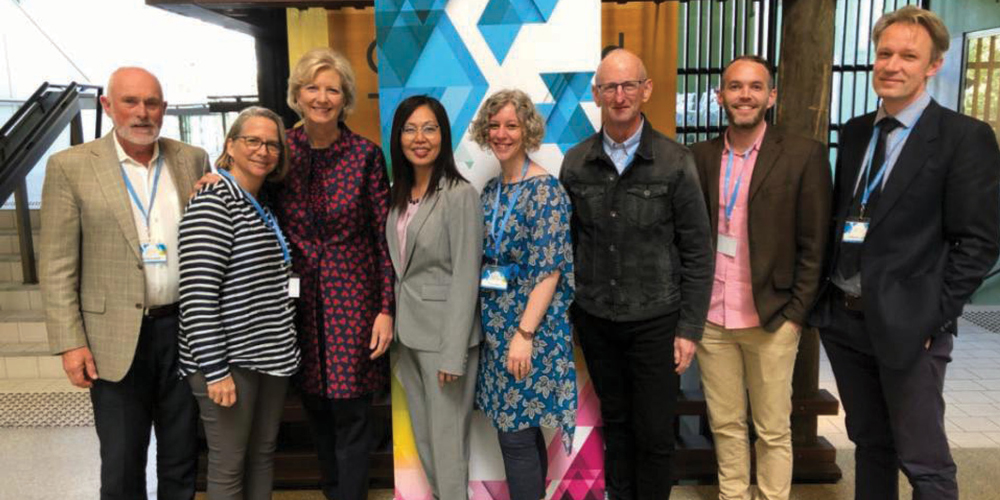Magazine

It’s Worth It
Fall 2019
Shirley V. Hoogstra
Australia is simply a beautiful country. Though it can take 24 hours to arrive on its beautiful shores when you’re traveling from the other side of the world, it is worth the effort. Rainforests, uncrowded beaches, and new and thriving cities are reasons enough to visit Australia, but the five private institutions of Christian higher education associated with the CCCU (Alphacrucis College, Avondale College of Higher Education, Christian Heritage College, Eastern College of Australia, and Excelsia College) made my recent trip to Australia remarkable.
These institutions are doing pioneering work and making an impact on the culture and thought life of Australia – no easy task, given the British-based system of education that favors the 40-plus state-supported universities. Unlike the United States, financial aid is not generally given directly to students in Australia; instead, state financial support goes only to institutions that have achieved a particular academic status based on criteria that heavily weighs the research produced by the university. While an institution can apply for university status, the odds are stacked against the 1000-plus non-university institutions – after all, you need money to underwrite research, and those institutions can’t get research accomplished without financial support. There is also not a well-developed history of philanthropic giving from the general public to higher education institutions.
But these challenges have not stopped the intrepid and visionary leadership, faculty, and staff of those five CCCU institutions that are determined to survive and thrive, just as the U.S.-based CCCU institutions did decades ago when they, too, faced challenges in building their faculty, their academic programs, and their reputations.
In these situations, a key way to survive and thrive is to band together as an association of institutions, and that’s what these Australian institutions have done; in addition to their membership with the CCCU, they have worked with other Christian institutions and created the Australian Christian Higher Education Alliance (ACHEA). Eighteen months ago, I was invited to speak at ACHEA’s research symposium. This symposium helped the faculty from these institutions present and publish on the theory, practice, and distinctives of Christian higher education in the Australian context; after attending this event, I know that the book that will be published from the symposium will have relevance for all of us in Christian higher education.
Why is all this effort these institutions are going through worth it? Why bother with persisting in this cause of Christian higher education? Here is what I say when people ask me these questions: Our world needs Christians in all areas of life. Christian higher education not only instills the academic knowledge its students need, but it also believes that the formation of the whole person through Christian thought, practice, and action is essential for the common good.
Serious societal ills, many of which are intractable in nature, need Christians to be educated and equipped to serve and find solutions. As a 2017 Forbes article highlighted, there have been significant gains in decreasing poverty, increasing literacy, reducing infant mortality, and promoting and establishing fairer governments. Yet there is still much to be done. To name just a few examples: The U.N. High Commissioner for Refugees reported that nearly 71 million people had been “forcibly displaced” by conflict at the end of 2018 – a new high. Educational disparity continues in the U.S. and abroad. Solutions are needed to address the rising tide of mental health issues facing families, communities, and the nation.
I like to say, “If you can’t count on Christians, who can you count on?” But being a wise Christian who makes a difference in the world doesn’t magically happen. Being wise happens through study, mentoring, and practice – the kind of study, mentoring, and practice that happens at Christian colleges and universities. There, students study the Bible and apply biblical principles to the questions in their disciplines. In studying the Bible, students learn that wisdom comes from the indwelling of the Holy Spirit. Through prayer and community practice, the Spirit is discerned. At Christian colleges and universities, students form mentoring relations with older, wiser, more mature men and women of faith. The class discussions; the conversations around a thesis project; the model of faculty, staff, and other classmates and alumni serving and living out their faith – all of these elements provide students the exemplars for living out Christ-centered, prudent, service-filled, sacrificial lives. These characteristics gird up the wise life. Students at Christian colleges and universities see people who practice what they preach, and then they themselves have opportunities in community to practice what’s been taught.
Your alumni represent hundreds of thousands of examples of wise, remarkable, Christ-loving, community-serving individuals. We’ll be highlighting just a few of these stories throughout October on social media as part of our celebration of Christian Higher Education Month. These individuals exemplify why Christian higher education is worth it. We who are working day in and day out on the sometimes mundane, sometimes glorious aspects of life in our institutions have the privilege to join our students and alumni in making a difference for Christ. Now that’s worth it.